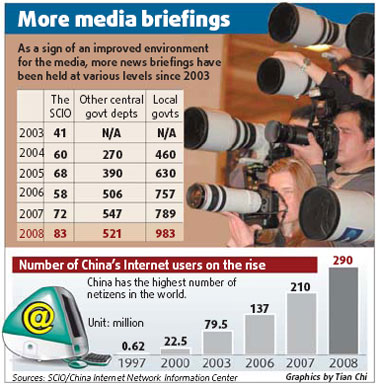
|
CHINA> National
 |
|
More Party organs open to media
By Hu Yinan (Xinhua/Agencies)
Updated: 2008-12-31 07:42 Press offices have been set up and spokespersons have been selected and trained for seven of the Communist Party of China's (CPC) core bodies, State Council Information Office (SCIO) Minister Wang Chen told a news briefing on Tuesday. The latest moves are in line with increasing transparency in government and a more open environment for the media, Wang said.
Leaders from more top Party organs are also scheduled to meet the press next year, he said. The seven Party departments include the CPC Central Committee's Central Commission for Discipline Inspection, United Front Work Department, Organizational Department, International Department, Taiwan Affairs Office, the Party Literature Research Center and the Party History Research Center. A brochure containing contact information on each of the department's spokesperson, as well as those of other government ministries, was released prior to the briefing. China has gradually set up a three-tiered news briefing and spokesperson system at the SCIO, central government and Party organs, as well as at local administrations, after the SARS outbreak in 2003.
 The Chinese military introduced its first spokesperson, Hu Changming of the Ministry of National Defense, in mid-May. Having more spokespersons for the CPC's central departments would be the next logical step, analysts said. With government, military and Party officials all involved in the spokesperson program, Wang reminded journalists that the "frequent, timely and authentic" news briefings his office held during this eventful year have also seen "tremendous progress". The media sessions addressed the concerns of the public at home and abroad, honored the public's right to information and provided convenience for journalists to report China more objectively and accurately, he said.
These media briefings and relevant interview services aim to "present a real and changing China to the world", he said, citing the office's swift response to the May 12 earthquake in Sichuan province as an example. The SCIO held 20 media briefings in 18 consecutive days from May 13, a day after the disaster that left 90,000 people dead or missing. While acknowledging that a number of local officials are either "reluctant or unwilling" to deal with journalists, Wang said his office would strive to further push open the media environment "to better serve the press" in the coming year. The Internet will play an increasingly important role to that effect, he said. The country is said to have the world's largest online community with 290 million users, 2.1 million websites and more than 100 million blogs. "Such a condition is impossible without a fully open (environment) and good policies," Wang said. The country would also release its first national action plan on human rights early next year, Wang said. "The document has concrete measures, including efforts in poverty reduction, protection of women and children's rights, and (promoting) economic and social equality," he said. The SCIO and Foreign Ministry are drafting the action plan, with more than 50 departments, public associations and non-governmental organizations involved, he said. The government issued the first white paper on the country's human rights situation in 1991, officially adopting the concept of "human rights" in its political strategy. The country has issued 40 such documents since, but has never had a state action plan detailing its moves on the issue. |